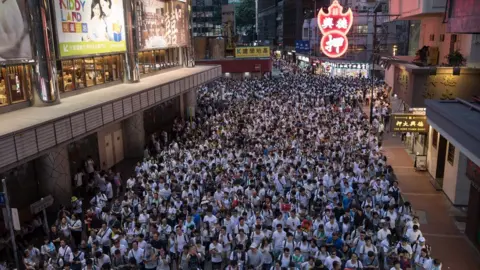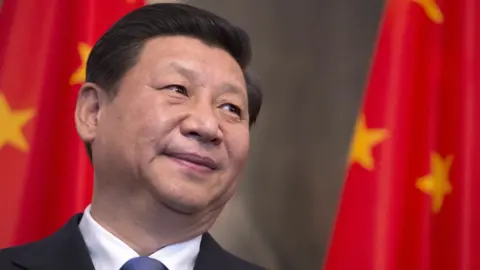Hong Kong protesters demonstrate against extradition bill
Hundreds of thousands of people have marched in Hong Kong against a law critics fear could let China target political opponents in the territory.
The controversial extradition bill would allow suspected criminals to be sent to mainland China for trial.
Organisers say there were one million people, which would make it the biggest march in more than 20 years. Police say there were 240,000 at its peak.
After it ended, clashes erupted between hundreds of demonstrators and police.
Protesters, some wearing surgical masks, tried to break into the Legislative Council complex, throwing crowd control barriers around, and police in riot gear used batons and pepper spray.
Some of the protesters and policemen were later seen with faces covered in blood.
Critics to the bill say those in the former British colony would be exposed to China's deeply flawed justice system, and it would lead to further erosion of the city's judicial independence.
But supporters say safeguards are in place to prevent anyone facing religious or political persecution from being extradited to mainland China, and that the proposal will plug loopholes.
How did the protest unfold?
For several hours on Sunday, protesters marched in the sweltering heat dressed in white, in a mainly peaceful demonstration that included a wide range of people - from businesspeople and lawyers to students, pro-democracy figures and religious groups.
Many carried banners saying "Scrap the evil law!" and "Oppose China extradition!".
The figures given by organisers and police vary because of the different methods they use to calculate the crowds: while organisers estimate overall numbers, police look at how many people were gathered at one peak.
If the organisers' estimate is confirmed as correct, it would be the largest demonstration in Hong Kong since the territory was handed to China in 1997.
The march was seen as a major rebuke of Hong Kong's leader Carrie Lam, who has pushed for the amendments to be passed before July.
"This is the end game for Hong Kong, it is a matter of life or death. That's why I come," Rocky Chang, a 59-year-old professor, told Reuters news agency.
 EPA
EPA"The people's voices are not being heard," 18-year-old student Ivan Wong told AFP news agency. "This bill will not just affect Hong Kong's reputation as an international finance centre, but also our judicial system. That has an impact on my future."
Reacting to the protest, a government spokesman said in a statement the proposals were "firmly grounded in the rule of law" and that the second reading of the bill at the Legislative Council would resume on Wednesday.
What are the proposed changes?
The changes will allow for extradition requests from authorities in mainland China, Taiwan and Macau for suspects accused of criminal wrongdoing such as murder and rape.
The requests will then be decided on a case-by-case basis.
Hong Kong officials have said Hong Kong courts will have the final say over whether to grant such extradition requests, and suspects accused of political and religious crimes will not be extradited.
The government has sought to reassure the public with some concessions, including promising to only hand over fugitives for offences carrying maximum sentences of at least seven years.
There has been a lot of public opposition, and critics say people would be subject to arbitrary detention, unfair trial and torture under China's judicial system.
Why the change now?
The latest proposal has come after a 19-year-old Hong Kong man allegedly murdered his 20-year-old pregnant girlfriend while they were holidaying in Taiwan together in February last year. The man fled Taiwan and returned to Hong Kong last year.
Taiwanese officials have sought help from Hong Kong authorities to extradite the man, but Hong Kong officials say they cannot comply because of the lack of an extradition agreement with Taiwan.
But the Taiwanese government has said it will not seek to extradite the murder suspect under the proposed changes, and has urged Hong Kong to handle the case separately.
Isn't Hong Kong under Chinese rule anyway?
A former British colony, Hong Kong is semi-autonomous under the principle of "one country, two systems" after it returned to Chinese rule in 1997.
The city has its own laws and its residents enjoy civil liberties unavailable to their mainland counterparts.
 Getty Images
Getty ImagesHong Kong has entered into extradition agreements with 20 countries, including the UK and the US, but no such agreements have been reached with mainland China despite ongoing negotiations in the past two decades.
Critics have attributed such failures to poor legal protection for defendants under Chinese law.
